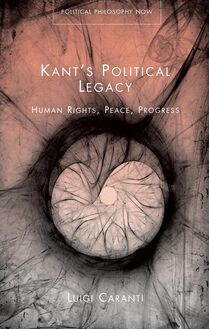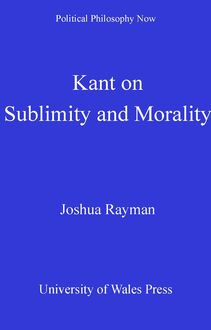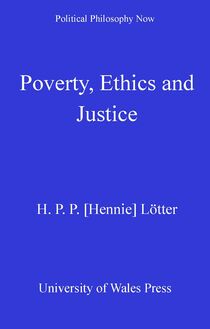-
 Univers
Univers
-
 Ebooks
Ebooks
-
 Livres audio
Livres audio
-
 Presse
Presse
-
 Podcasts
Podcasts
-
 BD
BD
-
 Documents
Documents
-
- Cours
- Révisions
- Ressources pédagogiques
- Sciences de l’éducation
- Manuels scolaires
- Langues
- Travaux de classe
- Annales de BEP
- Etudes supérieures
- Maternelle et primaire
- Fiches de lecture
- Orientation scolaire
- Méthodologie
- Corrigés de devoir
- Annales d’examens et concours
- Annales du bac
- Annales du brevet
- Rapports de stage
La lecture à portée de main
Vous pourrez modifier la taille du texte de cet ouvrage
Découvre YouScribe en t'inscrivant gratuitement
Je m'inscrisThe Moral Standing of the State in International Politics , livre ebook
Découvre YouScribe en t'inscrivant gratuitement
Je m'inscrisEn savoir plus
Vous pourrez modifier la taille du texte de cet ouvrage
En savoir plus

Description
Kant’s moral and political philosophy has been important in developing ethical thinking in international relations. This study argues that his theory of the state is crucially important for understanding the moral agency of the state as it is discussed in contemporary debates. For Kant, it is argued that the state has not only duties but also, controversially, inalienable rights that ground its relationship to its citizens and to other states. Most importantly, the state – regardless of its governmental form or factual behaviour – has a right to exist as a state. The Kantian account provided, therefore, explores not only the moral agency but also the moral standing of the state, examining the status of different kinds of states in world politics and expectations towards their ethical behaviour. Every state has a moral standing that must be respected in a morally imperfect world gradually transforming towards the ideal condition of perpetual peace.
Note on references and translations
Introduction
Chapter One: The Moral Standing Problem in the study of world politics
Chapter Two: Kant and the metaethical conception of the state
Chapter Three: As to what relations among human beings and states ought to be
Chapter Four: Rights and duties of the state
Chapter Five: Order and justice in the world of imperfect states
Chapter Six: On contested continuity of states
Conclusions
Bibliography
Sujets
Informations
| Publié par | University of Wales Press |
| Date de parution | 15 juillet 2021 |
| Nombre de lectures | 0 |
| EAN13 | 9781786837882 |
| Langue | English |
Informations légales : prix de location à la page 0,4700€. Cette information est donnée uniquement à titre indicatif conformément à la législation en vigueur.
Extrait
POLITICAL PHILOSOPHY NOW
Chief Editor of the Series:
Howard Williams, Aberystwyth University, Wales
Associate Editors:
Wolfgang Kersting, University of Kiel, Germany
Renato Cristi, Wilfrid Laurier University, Waterloo, Canada
Susan Meld Shell, Boston College, Massachusetts, USA
David Boucher, Cardiff University, Wales
Affiliate Editors:
Peter P. Nicholson, formerly of University of York, England
Steven B. Smith, Yale University, USA
Political Philosophy Now is a series which deals with authors, topics and periods in political philosophy from the perspective of their relevance to current debates. The series presents a spread of subjects and points of view from various traditions which include European and New World debates in political philosophy.
Also in series
Kant’s Doctrine of Right in the Twenty-first Century
Edited by Larry Krasnoff, Nuria Sánchez Madrid and Paula Satne
Hegel and Marx: After the Fall of Communism
David MacGregor
Politics and Teleology in Kant
Edited by Paul Formosa, Avery Goldman and Tatiana Patrone
Identity, Politics and the Novel: The Aesthetic Moment
Ian Fraser
Kant on Sublimity and Morality
Joshua Rayman
Politics and Metaphysics in Kant
Edited by Sorin Baiasu, Sami Pihlstrom and Howard Williams
Nietzsche and Napoleon: The Dionysian Conspiracy
Don Dombowsky
Nietzsche On Theognis of Megara
Renato Cristi and Oscar Velásquez
Francis Fukuyama and the end of history
Howard Williams, David Sullivan and E. Gwynn Matthews
Kant’s Political Legacy: Human Rights, Peace, Progress
Luigi Caranti
POLITICAL PHILOSOPHY NOW
The Moral Standing of the State in International Politics A Kantian Account
Milla Emilia Vaha
UNIVERSITY OF WALES PRESS • 2021
© Milla Emilia Vaha, 2021
All rights reserved. No part of this book may be reproduced in any material form (including photocopying or storing it in any medium by electronic means and whether or not transiently or incidentally to some other use of this publication) without the written permission of the copyright owner except in accordance with the provisions of the Copyright, Designs and Patents Act. Applications for the copyright owner’s written permission to reproduce any part of this publication should be addressed to the University of Wales Press, University Registry, King Edward VII Avenue, Cardiff CF10 3NS.
www.uwp.co.uk
British Library Cataloguing-in-Publication Data A catalogue record for this book is available from the British Library.
ISBN 978-1-78683-786-8
e-ISBN 978-1-78683-788-2
The right of Milla Emilia Vaha to be identified as author of this work has been asserted in accordance with sections 77, 78 and 79 of the Copyright, Designs and Patents Act 1988.
The publisher has no responsibility for the persistence or accuracy of URLs for any external or third-party internet websites referred to in this book, and does not guarantee that any content on such websites is, or will remain, accurate or appropriate.
Contents
Note on References and Translations
Acknowledgements
Introduction
1 The Moral Standing Problem in the Study of World Politics
2 Kant and the Metaethical Conception of the State
3 As to What Relations among Human Beings and States Ought to Be
4 Rights and Duties of the State
5 Order and Justice in the World of Imperfect States
6 On Contested Continuity of States
Conclusions
Notes
Bibliography
Note on References and Translations
I use several different English translations of Kant’s main political texts and change between translations where I deem it necessary for clarity and meaning. For this reason, I offer double references in-text: first, I indicate the page numbers of Kant’s texts as they are provided in the standard German edition, the Akademie Edition ( Kants gesammelte Schriften ); second, I provide the translation and page number of each particular reference (e.g. 6:231, in Gregor, p. 387). The references to The Metaphysics of Morals are from Gregor’s Practical Philosophy , unless stated otherwise.
The translations I use are as follows:
Political Writings , edited by H. S. Reiss, translated by H. B. Nisbet (Cambridge: Cambridge University Press, 1991).
The Metaphysics of Morals , translated and edited by Mary J. Gregor (Cambridge: Cambridge University Press, 1996). Toward Perpetual Peace and Other Writings on Politics, Peace, and
History , edited and with an introduction by Pauline Kleingeld, translated by David L. Colclasure (New Haven, NJ: Yale University Press, 2006).
Practical Philosophy , translated and edited by Mary J. Gregor (Cambridge: Cambridge University Press, 2008).
Groundwork for the Metaphysics of Morals , edited and translated by Allen W. Wood (New Haven, NJ: Yale University Press, 2002).
Acknowledgements
It took me over ten years to do this little book. The journey towards it began in the early 2010, when I was a visiting student at Aberystwyth University, halfway through my PhD. I am not sure if Howard Williams, chief editor of this series, remembers, but during one discussion on Kant’s political philosophy he asked me if I knew that I had some good ideas. His words have been important to me whenever I have felt frustrated with academic writing and doubted myself.
It is, therefore, no coincidence that almost ten years later I turned to Howard and the University of Wales Press with my book proposal. After completing my doctorate studies at the European University Institute, I had started new research projects in areas other than the moral personality of the state. But the journey felt incomplete and unaccomplished. Howard provided me with some useful comments and a critical question: was I committed to further working on those ideas to develop them into a book manuscript? I was by then ready to leave academia altogether and start training horses for a living, so I was not quite sure how to answer to him; the answer I eventually gave, however, was in the affirmative. Thanks to Howard, the reviewers and the most helpful editorial staff at UWP, this book was completed.
Over the years, I have worked in many institutions and met many great scholars and students with whom I have discussed the questions explored in this book. These discussions have taken place inside and outside the classroom, at several Hilton conference halls, and frequently over a glass of wine – in dozens of cities around the world. If I would list all those people who have influenced, criticised, supported and sparred with me, the acknowledgements would be longer than the book. I will therefore thank all of you collectively, and hope that you know who you are.
Benjamin Wheeler, you not only travelled across the world with me so I could have my dream job at the University of the South Pacific, but you read my manuscript almost as many times as I did. You have persistently dealt with Kant, my weird sentence structures, and my moods. I would not have started, or finished, this project without you.
At my first post-doctorate full-time teaching job at the University of Turku, I was interviewed by the student paper and said, half-jokingly, that I wished one day students at universities studying International Political Theory would read Kant, Rawls and Vaha. I am not sure if I have much more in common with Kant than a four-letter surname (and perhaps I share Kant’s and Rawls’s interest in justice), but I have always had a wild imagination. As Kant says, however, happiness is not an ideal of Reason, but of Imagination. We may not all become Kant or Rawls (nor do we have to), but we can all dream. I want to dedicate this book to all those who struggle with the academic culture of publish or perish; who think they work too little and procrastinate too much; who at times doubt themselves and their abilities – but who nonetheless carry on.
Milla In Suva, the little capital city of the Big Oceanic State June 2021
Introduction
‘I’ve become more and more convinced that one day we will resolve our frictions without having to use force and conflict … It might take a couple of centuries, but I’m certainly giving it a shot.’ – Roméo Dallaire 1
In the early twentieth century, Émile Durkheim wrote that ‘as long as there are states, so there will be national pride, and nothing can be more warranted. But societies can have their pride, not in being the greatest or the wealthiest, but in being the most just , the best organised and in possessing the best moral constitution .’ 2 When we use a phrase like ‘best moral constitution’ to describe a society we often refer to a state that is a democracy, secures the human rights of its citizens and acts peacefully towards other states in the international society. Additionally, a just state is one that is responsible , particularly regarding international peace and security. As William Wohlforth et al. note in their article on moral authority and status in world politics, ‘assuming moral responsibility for orderly maintenance of the international system, especially in matters of international peace and security, has always been one of the hallmarks of high international status and great powerhood.’ 3
Humanitarian catastrophes in the early 1990s, including the Rwandan genocide and the conflict in the former Yugoslavia, brought scholarly attention to the status of states, challenging the norms of equal sovereignty and the right to non-intervention as they are stipulated in Article 2(4) of the United Nations Charter. These crises contested both the legality and legitimacy ( morality ) of the use of force, and scholars and practitioners alike began to question whether or not there could ever be justification for the state to have the right to non-interference in the case of severe human rights violations. The International Committee of Intervention and State Sovereignty (ICISS) famously asserted that the opposite was the case:
Rather than accept the view that all states are legitimate … states should only qualify as legitimate if the
-
 Univers
Univers
-
 Ebooks
Ebooks
-
 Livres audio
Livres audio
-
 Presse
Presse
-
 Podcasts
Podcasts
-
 BD
BD
-
 Documents
Documents
-
Jeunesse
-
Littérature
-
Ressources professionnelles
-
Santé et bien-être
-
Savoirs
-
Education
-
Loisirs et hobbies
-
Art, musique et cinéma
-
Actualité et débat de société
-
Jeunesse
-
Littérature
-
Ressources professionnelles
-
Santé et bien-être
-
Savoirs
-
Education
-
Loisirs et hobbies
-
Art, musique et cinéma
-
Actualité et débat de société
-
Actualités
-
Lifestyle
-
Presse jeunesse
-
Presse professionnelle
-
Pratique
-
Presse sportive
-
Presse internationale
-
Culture & Médias
-
Action et Aventures
-
Science-fiction et Fantasy
-
Société
-
Jeunesse
-
Littérature
-
Ressources professionnelles
-
Santé et bien-être
-
Savoirs
-
Education
-
Loisirs et hobbies
-
Art, musique et cinéma
-
Actualité et débat de société
- Cours
- Révisions
- Ressources pédagogiques
- Sciences de l’éducation
- Manuels scolaires
- Langues
- Travaux de classe
- Annales de BEP
- Etudes supérieures
- Maternelle et primaire
- Fiches de lecture
- Orientation scolaire
- Méthodologie
- Corrigés de devoir
- Annales d’examens et concours
- Annales du bac
- Annales du brevet
- Rapports de stage




















